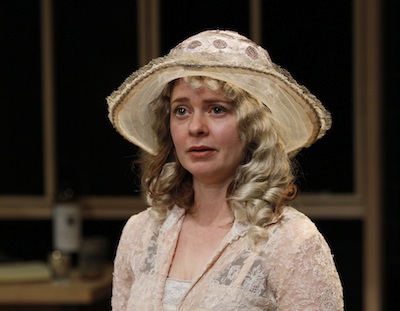By Diana Brement , JTNews Columnist
Seattle’s beleaguered Intiman theater has reopened this summer with a festival, four plays presented in rotation for two months, one of which is John Patrick Shanley’s “Dirty Story.” This article begins with the same warning as any other piece you’ll read about this play: Don’t read further if you want to experience the plot’s surprise elements.
This 2003 play is staged in an intimate new studio theater in a room behind Intiman’s main stage, and seats only 100. The actors play out this political farce in a corner only slightly larger than a boxing ring, providing a hard-hitting look at “one of the touchiest political issues on the planet,” according to the program.
You’ll think you’re seeing an absurdist relationship drama in Albee style when the play opens. Oscar, Pulitzer and Tony-winning Shanley (“Moonstruck,” “Doubt”) is known for writing about love-hate relationships.
Wanda (Carol Roscoe) is a naïve graduate student who gets a disaffected and cynical writer, Brutus (Shawn Law), to look at her book manuscript. They meet at a New York City park where Brutus is playing chess alone at one table and a British chap — wearing headphones and occasionally shouting, “I want to go home!” — plays at another.
When Brutus invites Wanda to his apartment, she recognizes it as her grandfather’s former home. Brutus’s seduction turns sadistic (the play is considered “R” rated so don’t bring the kids), but there’s a twist at the conclusion of the first act.
The second act turns into a farce as Frank the cowboy (Quinn Franzen) and Lawrence/Watson the British barkeep (Allen Fitzpatrick) are discussing the ups and downs of their own relationship, even breaking into a song and dance number. Wanda dances in to the theme from Exodus and together they plan to allow her to get her share of Brutus’s apartment. She’s already moved in, decorated it with potted palms and pushed him and his stuff into a small corner while he whines about it.
While the first act is titled “Fiction” and the second “Non-Fiction,” don’t believe it for a minute, because it’s in the second act that the topic becomes clear. If you haven’t figured it out already, Wanda is Israel and Brutus, whose wealthy but distant family is in the “olive oil” business, is the Palestinians. The parallels are more clearly drawn here and put the first act into an entirely different light. Intiman artistic director Andrew Russell says that some audience members have returned to see the play again in order to better understand it.
“Absurdity is born out of the futility of human struggle,” observes director Valerie Curtis-Newton, who explained that Shanley wrote the play after a post-9/11 visit to Israel and the West Bank, where he learned that the conflict there was not easily explained or resolved.
“He was frustrated,” she says, and also saw “whispers of the same intransigence emerging in American politics” that is still with us today.
Most political plays are serious dramas, “and that’s really hard on people,” Curtis-Newton says. “Shanley wrote a crazy, funny, bizarre” play that “gets at different points of view, tries to begin a conversation” — which is what she’s interested in.
There was some fear about staging the potentially controversial play, “of offending any community.” She had some Jewish friends read it and they were wary. However, on seeing it, most were “pleasantly surprised… I’ve had very few people dislike it purely on the basis of the politics,” she says. “Everyone is skewered in this play.”
Russell made the final choice of the play.
“Intiman audiences have always been intellectually adventurous and it felt like this humorous, sharp, gut-punch of a comedy would make them lean forward with curiosity,” he wrote in an email, adding that it has “sparked a lot of discussion and debate.”
Curtis-Newton, who is also the head of directing at the University of Washington’s Drama School, says it was a challenge to stage the production in such a small space, and one not designed as a theater. The audience and their reaction can be clearly seen by the performers, providing instant feedback, and the audience can see each other, too. But the space is not soundproof and outside noise does leak in.
One thing a Jewish viewer might note is that Roscoe and Law, who claim in the first act to be a “German Jew” and a “Jew German,” don’t seem particularly Jewish or Shanley uses this device more to emphasize the close relationship between the two. Besides, it’s a play, and some suspension of disbelief, and some desire to be entertained, are required.
